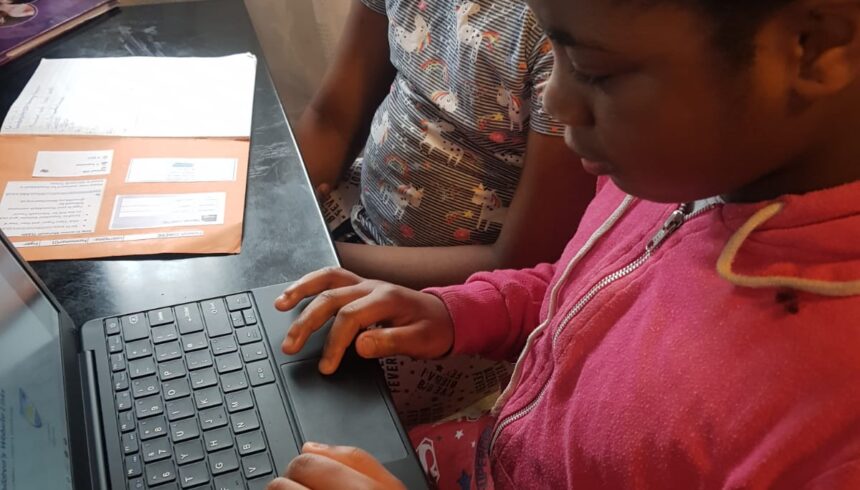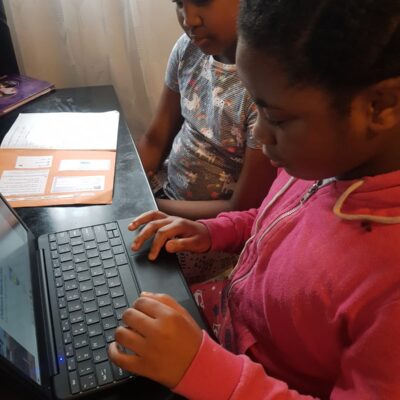Can you imagine trying to navigate the complex UK asylum system, book a COVID test, send an email to your solicitor, download your children’s homework or sign up to virtual English classes, without access to a phone or a laptop?
Since the pandemic began last March, all of us have seen a seismic shift in the way we are working and living our lives. During these many months of social distancing measures and lockdowns, we have remained connected to our communities, behind our screens which offer a vital window to the outside world.
For many of our friends seeking asylum, this window is closed and the blinds have been drawn ever since the pandemic hit last March, when our Day Centre and all other face to face services had to be suspended. Our friends were plunged into further isolation and disconnected from society, finding themselves unable to access basic services and meet their essential needs. Before, the destitute refugees we serve relied almost exclusively on visiting the JRS weekly Day Centre and attending refugee activities in order to receive a warm welcome, collect toiletries and travel money, maintain regular social contact, and even eat a nutritious hot meal.
One of the ways we have continued to accompany our friends in need while we can’t see them in person, is by providing access to laptops, smartphones, tablets and mobile data.
These are devices that many of us absolutely take for granted. But for our refugee friends, who are battling an unjust and inhumane UK asylum system, who are banned from working, forced in to destitution, and excluded from society, these items are at best a costly luxury, and at worst, completely inaccessible.
Thanks to your generosity, support from SocialBox, and support from LDS Charities, we are delighted to know that 80 refugee friends have already, directly benefitted from receiving an electronic device.
So far, we have distributed 21 laptops, 9 tablets and 47 smart phones
We’re still looking for donations of used (and in working condition) smart phones
The impact a new laptop, tablet or smartphone can have, cannot be underestimated. Rhiannon Prideaux, Emergency Response Coordinator at JRS UK spoke of the moving transformation she witnessed in one refugee friend of JRS:
“When we gave a laptop to one of our refugee friends who is struggling, and often quite down, she was really happy. Everything else in her life was so incredibly difficult, it was so clear what a difference receiving something had on her. She had requested a laptop from us a long time ago and had since almost forgotten about it, so she wasn’t expecting it. In that moment it really improved her wellbeing and positivity. Rather than the obvious practical benefits of receiving the laptop, what struck me was her joy at simply having somebody think of her, and gift her something that she truly needed.”
A boost in mental wellbeing is very important, as it provides our friends with the strength and energy to continue with the many challenges they face in their daily lives. One refugee friend, Abdul, who is hosted as part of the JRS ‘At Home’ scheme, recently received a laptop and said:
“I feel very confident that now I can improve my English [and] with Zoom I can contact with my friends, family and so many things in your organisation. So I don’t feel lonely and isolated and I don’t feel that I’m left behind because, you know, the technology is moving so fast.”
Abdul, and dozens of others like him, are now able to connect with other people again, contact loved ones far away, sign up for volunteering, and other virtual social projects which they desperately need in order to flourish as human beings. This added confidence of a laptop comes not only from building these social networks, but also from gaining and improving crucial life skills. Seeking asylum in the UK is often described by our friends as a time of uncertainty, a time of extended waiting, and fearing for the worst. While many wait months or even years to be recognised as refugees by the UK government, they lose out on key stages of their lives; the opportunity to build on their knowledge, skills and talents, as they get left behind. Abdul said:
“[The] most important thing, I feel that I can catch up [with] the pace of technology because without technology, life is very difficult. [Before I had] an old phone and it was very, very difficult, because the software was old – and it was very, very difficult for me at the rate of learning, the pace was very, very slow. I was able to only learn a few words, a few sentences in that day. And most important thing was the problem with typing. You know, everything is now going to be done via online. So you need to type to reply with emails and different modes of communication. So a laptop is a necessity, I think, especially during this pandemic, because everyone is communicating with you online instead of personally or physically. So I think it’s the most important tool at the moment, a laptop. Not only you can learn English, you can learn many things.”
Rhiannon, says:
“I think this reinforces the importance of people having these devices in order to be able to be independent, and access services. One friend we bought a phone for had just registered with us, and she was facing homelessness. In order to be able to do a refer her on to our hosting scheme, we needed to do a video call so we could get to know her, and build a relationship before she could be matched with a volunteer host. We urgently needed to get her a phone before my colleague could set up the call. We managed to get her a smartphone, and set up the call, and now she is going to be able to be hosted. The smartphone was such an important step towards other support.”
With laptops, tablets or smartphones, our refugee friends can progress their cases and their lives. They can contact us, and other organisations, who can regularly offer them shelter, food, casework, legal advice and even emotional support.
In a culture that seeks to discourage and vilify our friends seeking asylum, it is often children who are shockingly the victims of the hostile environment. As schools are closed, all parents are having to juggle the many responsibilities of life with home schooling their children. But how can your child log in to their online lesson, and download their homework if you can’t afford a laptop? One refugee friend Anne, recently received laptops for her two children, who were unable to keep up with their school work.
“They were really struggling to do their work. They can’t go to school … I would like to say it was really affecting me and really affecting them. When the laptop came… it was amazing, they told me ‘Mummy mummy mummy, … we have to thank JRS’. I don’t know what I would do without [JRS’s] support. This time around it was really tough”
Thanks to the new laptops, Anne and her family remain hopeful, as her children are now able to keep up with their peers.
“[The laptop] will really help them for the future because, they’ll be able to do their own work…they are not missing much at all [now], so it will really help them for their future. They are choosing to do their work, they are getting more knowledge. Yeah they are very happy – they will come and give me a hug, “Mummy, thank you mummy, you are the best mummy, thank you Mummy, I’m very happy for these laptops” because they love school – they really want to go to school. You have made their day, they can’t forget this, they can’t forget this at all, they are very grateful, and the laptop is really useful for them, it makes them happy.”
The lack of access to the internet through a laptop or a smartphone holds back vulnerable people like Anne and her young children who are made to suffer at the hands of a cruel and inhumane asylum system. It is a system that seeks to bring pain and destitution to the lives of those who have come to the UK seeking safety and refuge.
There is a long way to go in terms of granting our friends the justice, and compassion they deserve from a Home Office that refuses to recognise their humanity; yet we have seen over the last few months how life-changing support in their day to day lives doesn’t need to be complicated.
A laptop, smartphone or a tablet may not seem like much, but it is an opportunity for social connection, for building confidence, a tool for self-empowerment, for education and even access to a home.
As Abdul told me:
“JRS is helping the most marginalised and needy members of society. This is a big thing. This is a great thing, because most asylum-seekers, they are alone.”
Donate to our refugee friends’ hardship fund today and help us provide more life-changing support to our refugee friends



